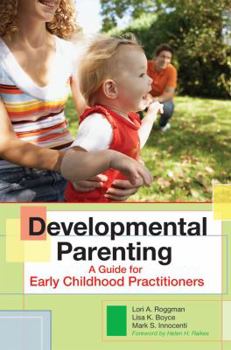Developmental Parenting: A Guide for Early Childhood Practitioners
Select Format
Select Condition 
Book Overview
Unlike other approaches that limit parents to a "student" role, the proven, the parenting-focused model in this book shows home visitors how to put parents and other caregivers confidently in charge of guiding and supporting their young children's development. Home visitors and other early childhood professionals will learn the ABCs of facilitating developmental parenting:
Attitudes. Be responsive, supportive, flexible, and culturally sensitive while looking for the family's strengths and building on them.Behaviors. Actively encourage positive parent-child interaction, support developmental parenting behaviors, establish a collaborative partnership with parents, use family activities as learning opportunities, and involve other family members.Content. Provide parents with clear and relevant information on child development, determine the best curricula for selecting and adapting parent-child activities, and learn to use assessments skillfully to evaluate child progress and parenting behaviors.
This how-to guidebook includes all the support early childhood professionals need to facilitate developmental parenting effectively. Program directors will get step-by-step guidance on supervising and evaluating the program, and professionals who work directly with parents will get easy-to-implement strategies, case studies of successful interactions, and tips and advice from other practitioners.
With this research-based and reader-friendly book, early childhood professionals will learn to put parents in charge of guiding their child's development--resulting in strong parent-child bonds, healthy families, and improved school readiness.
**Includes the Home Visit Rating Scales (HOVRS), an observation tool with seven rating scales for practitioners and supervisors to assess the quality of home visits from direct observation.
See how this product helps strengthen Head Start program quality and school readiness.
Related Subjects
Early Childhood Parenting & Relationships Social Science Social Sciences Social Work




